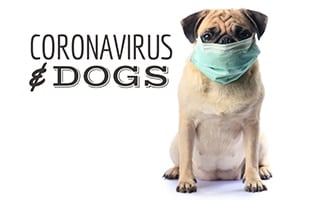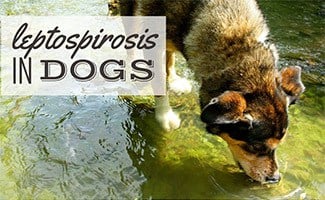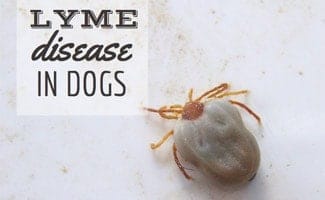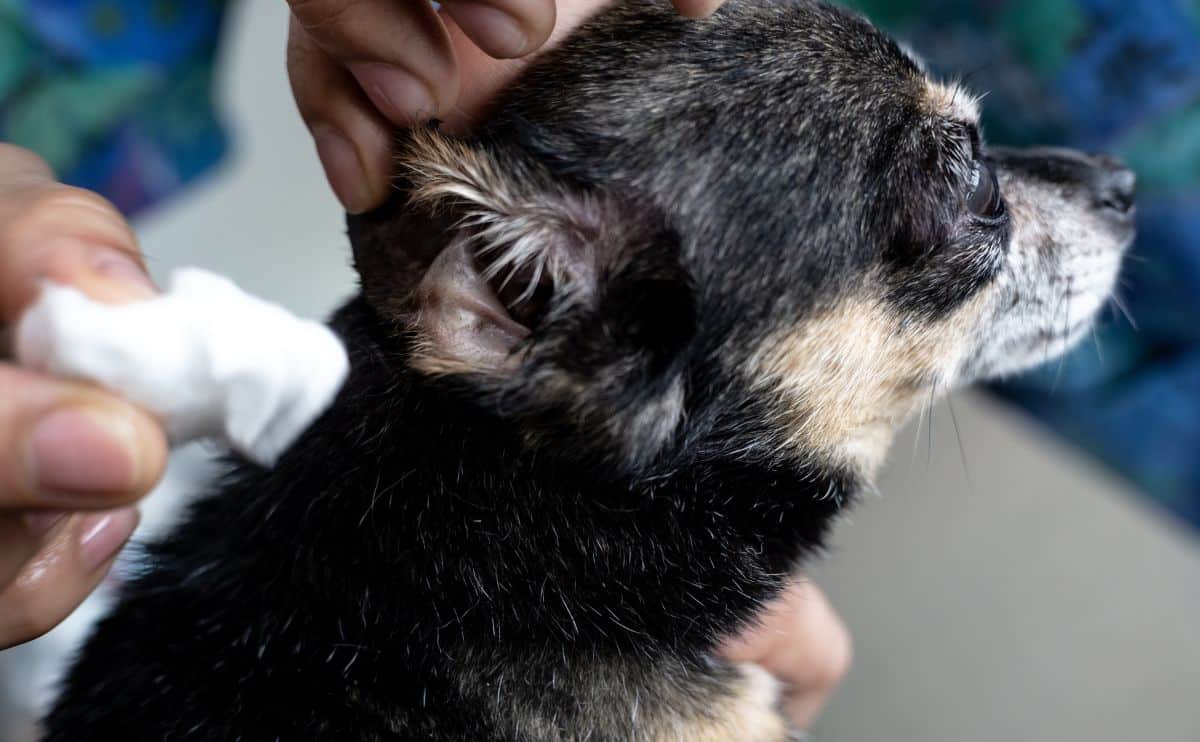Which Dog Vaccinations Are Necessary?
When you purchase through links on our site, we may earn a commission. Here’s how it works.
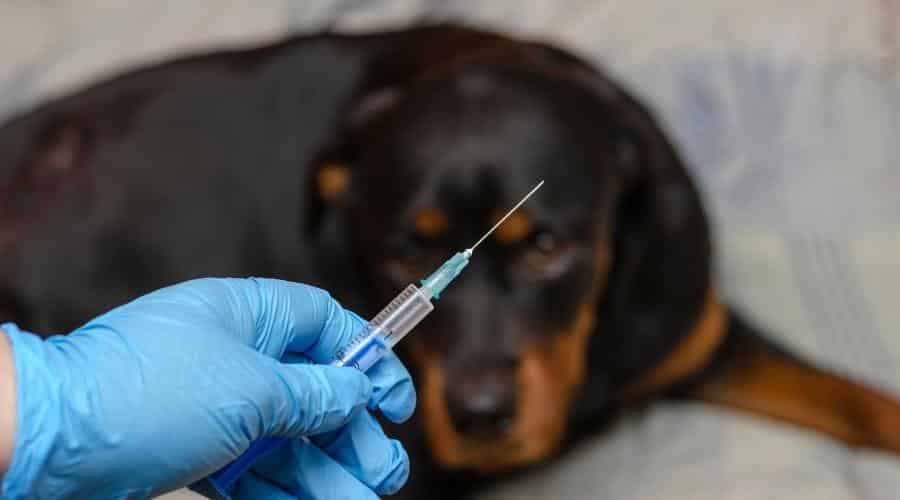
Vaccines are an important component of a dog’s health and wellness. Although dog vaccines are developed in different ways and come in various formulations, they all serve the same purpose: to protect dogs from diseases that can cause serious illness and even be fatal.
Table of Contents
There are many vaccines available for dogs, so you may be wondering which vaccines your dog actually needs. Plus, different vaccines have different vaccination schedules, making it a little confusing to know what vaccines your dog needs and when.
No one wants to put their dog through discomfort, and you may question whether all of these vaccinations are really necessary. We’ll help you learn about core (required) and non-core (not required) vaccinations.
What Do Vaccinations Do?
Vaccinations protect your dog against an array of illnesses. The basic premise of a vaccine is to prepare the immune system to recognize an infectious organism and effectively fend off that organism when it invades the body. That preparation involves developing antibodies that will specifically recognize and target infectious foreign invaders.
Vaccines are made in different ways. We won’t bog you down with all the technical details, but we can give you a basic overview. Some vaccines are called ‘modified live vaccines,’ containing small bits of live but weakened virus to activate the immune system. Others are killed vaccines, which contain dead virus. There are also vector vaccines, which use genetics to provide strong and durable protection against disease.
Some vaccines require what’s known as a booster, which is given at a specified time after the initial vaccination to help keep the vaccine effective over time.
Common Dog Vaccinations
Below is a list of typical dog vaccines. Some vaccines are considered necessary (core), while others are recommended but may not be required, depending on your dog’s exposure risk (non-core). Visit our puppy vaccination schedule to see what to expect when you bring a new pup home.
Core Vaccinations
Non-Core Vaccinations
A note on pricing: The prices we have listed are from our team’s personal experiences with vet visits. Our team is located across the U.S., so we have a variety of experiences. Additionally, we conducted independent research to help give you estimates on what these vaccines may cost you.
Common Core Dog Vaccinations

There are many considerations to make when vaccinating a dog. The first is local and country-wide laws that determine which vaccinations are mandatory for dogs living in the area.
These types of vaccinations are known as “core” vaccinations and are mandatory for all dogs. Core vaccinations are designed to protect animals from extreme illness or disease and include: the rabies vaccination (in most, but not all, states), CDV (canine distemper), CAV-2 (canine hepatitis virus or adenovirus-2), and CPV-2 (canine parvovirus.)
What Is Canine Distemper?
Canine distemper is an extremely contagious viral disease that is caused by the canine distemper virus. This disease is closely related to the virus that causes measles.
Symptoms
Canine distemper spreads through the air and attacks the tonsils and lymph nodes. The virus replicates in the body and attacks the gastrointestinal, respiratory, urogenital, and nervous systems.
Symptoms include high fever, runny nose, eye discharge, red eyes, lethargy, lack of appetite, coughing, vomiting, diarrhea, seizures, and paralysis. Some dogs also experience thickening or enlargement of their footpads.
Treatment
Unfortunately, there is no known cure for canine distemper. However, some dogs can recover fully after receiving treatment for symptoms and constant care. After a dog has fully recovered, she will no longer carry or spread the disease.
Canine Distemper Vaccination
The canine distemper vaccination is given as a part of a combination vaccination, most commonly the DHLPP. The “D” in DHLPP stands for distemper. This vaccination, known as the five-way vaccine, also protects against hepatitis (adenovirus), leptospirosis, parvovirus, and parainfluenza.
The vaccine is given in a series. Dogs should receive vaccination against canine distemper starting at six weeks, then every two to four weeks until 16 weeks of age. A booster shot is provided at 12 months and then every three years.
Price
The canine distemper shot is typically included as a part of a combination vaccination, like DHLPP, DHPP, DAPP, DA2PP, etc. Pricing for combination vaccines varies from $7 to $32 on average.
What Is Hepatitis (Adenovirus Type 1)?
The canine adenovirus type 1 causes canine hepatitis. Dogs who suffer from this virus experience swelling and cell damage in the liver, resulting in hemorrhage and death. This virus is contracted through the feces and urine of infected dogs.
Symptoms
Symptoms include pain in the abdomen, abdominal distension, lack of appetite, pale color, lethargy, fever, and tonsillitis. Fluid swelling in the corneas often results in the appearance of the dog having blue eyes. Death within one to two days is common in more severe cases. However, if a dog survives the first few days, the dog can make a full recovery and have future immunity to the virus.
The canine adenovirus type 2 (CAV-2) is a relative of the hepatitis virus and is one of the causes of kennel cough. The CAV-2 vaccine doesn’t provide 100% protection from kennel cough, but the disease severity is limited if a vaccinated dog becomes infected, making the chance of death unlikely.
Symptoms of CAV-2 include hacking cough a week after exposure, inflammation in the airways, white foamy discharge after coughing, pink eye, inflamed nasal passages, and nasal discharge.
Adenovirus Cough & Hepatitis Vaccination
The CAV-2 vaccine will protect against kennel cough and hepatitis.
This shot is usually included in a combination vaccine such as the five-way vaccine or the seven-way vaccine. It is normally given starting at six weeks old, then every two to four weeks until 16 weeks of age. Another is given with a combination booster shot 12 months after the last interval dose and then every three years.
Price
The adenovirus-1 and adenovirus-2 shots are typically included as a part of a combination vaccination, like DHLPP, DAPP, DA2PP, etc. Pricing for combination vaccines varies from $7 to $32 on average.
What Is Parvovirus?
Canine parvovirus (parvo) is extremely contagious and is contracted through either direct contact with the feces of an infected dog or contact with virus-contaminated objects (e.g., food bowl, toys, etc.). Unfortunately, parvo often kills young puppies with poorly developed immune systems.
Symptoms
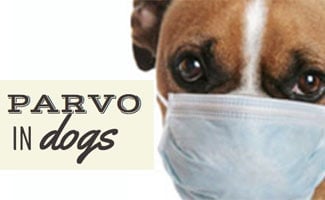
Dogs that have contracted parvo generally show symptoms within 3 to 10 days. The most commonly seen parvo symptoms include secondary infections, dehydration, lethargy, diarrhea, vomiting, endotoxemia, shock, and eventually death.
Dogs with confirmed parvo cases can infect neighborhood dogs with their feces and through soil that has come in contact with their feces. Dogs can still shed the parvovirus in their feces once they’ve recovered from the virus.
Treatment
Around 91% of untreated parvo cases result in death. The parvo vaccine is the only way to prevent a dog from contracting this virus. Parvo cannot be spread from dogs to humans. Learn more about Parvo treatment.
Parvovirus Vaccination
The parvovirus vaccine is given as a four- or five-way vaccine (DHPP or DHLPP).
The first dose is administered as young as six weeks old and is then given in a two to four-week interval until at least the age of 16 weeks old (totaling three times). A booster shot is given one year after the last interval dose, then again every three years.
The vaccine can take up to two weeks to take effect and fully protect a dog from it.
Price
The parvovirus is typically included as a part of a combination vaccination, like DHLPP, DAPP, DA2PP, etc. Pricing for combination vaccines varies from $7 to $32 on average.
What Is Rabies?
Rabies is a viral disease that can be carried by many mammals. It is a zoonotic disease, which is a disease that passes from animals to humans. If you ever think your dog has come in contact with rabies, you should immediately take her to the vet, even if she’s up to date on her rabies vaccination.
Rabies commonly transmits through a bite from an infected mammal. Rabies causes acute encephalitis (inflammation of the brain) and eventually infects the entire nervous system causing death.
Symptoms
Rabies’ symptoms include fever, paralysis, seizures, a dropped jaw, inability to swallow, hydrophobia (fear of water), pica (eating non-food items, like dirt), a change in bark tone, unusual aggression, lack of coordination, excessive salivation, and frothy saliva.
There are two forms of rabies: furious and paralytic (also called “dumb”). Once a dog contracts rabies, she’ll exhibit slight nervous system abnormalities. A few days later, the dog will die immediately or progress to the furious or paralytic infection stage.
A dog with furious rabies exhibits extreme behavioral changes. Furious rabies is often the type of rabies depicted in the media — the dog is aggressive and willing to attack. Dogs with paralytic rabies show a slow loss of coordination, weakness, and then paralysis.
Treatment
Rabies is curable if you treat dogs before symptoms occur. Once symptoms appear, the disease becomes fatal. Rabies can take anywhere from 2 to 12 weeks to present itself. However, some cases can take much longer.
Rabies Vaccination
Puppies 12 weeks old generally receive the rabies vaccine. However, this age may vary from place to place, depending on local laws. For instance, in Washington DC, the law requires dogs to get the rabies vaccine as early as four months old. The puppy gets a second rabies shot within one year after the first shot. After that, boosters are usually given once every one or three years, depending on the vaccination used and local laws.
Price
The rabies shot is administered as an individual immunization and not as a combination vaccine. The price is typically around $22 to $30.
Non-Core Dog Vaccinations
Non-core dog vaccinations are not mandatory except in areas where the specific illness or disease is rampant. Many vets will still offer these non-core vaccinations in areas where they’re not mandatory, but it’s up to the vet and the pet owner to decide whether the dog in question is a suitable vaccination candidate.
What Is Bordetella?
Kennel cough is caused by the bacteria Bordetella bronchiseptica and is spread through airborne contaminants. It is spread through exposure to infected dogs or the transfer of bacteria in food bowls, cages, and water bowls.
Symptoms
As bacteria multiply, they destroy the lining of the dog’s trachea, which results in a high-pitched cough that sounds like a goose honk.
Dogs may also gag and retch as they cough. Symptoms include fever, sneezing, nasal discharge, loss of appetite, and depression.
Treatment
Incubation for kennel cough is approximately five to seven days. When symptoms are present, the dog should be given antibiotics and a cough suppressant. Untreated kennel cough can lead to pneumonia and could even be fatal.
Bordetella Vaccination
Dogs receive the Bordetella vaccination as an injection inhaled nasal mist or orally. It takes 48 hours after the vaccination for a dog to develop immunity to the disease. Most kennels require dogs to have their Bordetella vaccination before they allow boarding. Bordetella vaccinations are generally given once every 12 months.
Price
The Bordetella shot is administered as an individual immunization and not as a combination vaccine. The price is typically around $27 to $29.
What Is Canine Influenza Virus?
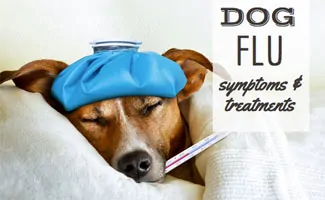
In the U.S., canine influenza (dog flu) is caused by two viral strains, H3N2 and H3N8. These are two highly contagious respiratory viruses that can be spread between dogs and cats, but there’s no evidence that canine influenza spreads to people. It’s typically recommended for dogs that have frequent exposure to other dogs in kennels, daycare, grooming facilities, etc.
Symptoms
Canine influenza typically causes a low fever, cough, nasal and eye discharge, lethargy, and reduced appetite, but some dogs don’t exhibit symptoms. The severity can range from no signs to severe illness leading to pneumonia, serious respiratory problems, and even death (in rare cases).
Treatment
For mild to moderate cases, treatment is supportive, making sure your pup stays hydrated and eats a healthy diet. However, many dogs develop a secondary bacterial upper respiratory infection which requires antibiotic therapy. Dogs who develop pneumonia usually require intravenous fluids, antibiotics, and other medications and may require hospitalization.
Most dogs recover within two to three weeks. It is important to consult with your veterinarian to determine the best course of treatment. Because canine influenza is so contagious, exposed dogs should be isolated from other dogs and cats for at least four weeks.
Canine Influenza Vaccination
The H3N2/H3N8 canine influenza vaccine requires two initial doses, two to four weeks apart, with a booster every 12 months after the second dose. The first dose may be administered to dogs as early as six to eight weeks of age.
Price
The canine influenza shot is administered as an individual immunization and not as a combination vaccine. The price is typically around $25 to $35.
What Is Canine Coronavirus?
Canine coronavirus (CCV) is a disease that affects the intestinal tract. This canine virus is not the same as COVID-19, a global pandemic in the human population. Coronavirus in dogs doesn’t usually last too long, but it does cause numerous side effects and complications in some cases.
Canine coronavirus spreads through feces and saliva. A dog has one to five days after being exposed to the disease for symptoms to present themselves. Illness typically lasts from 2 to 10 days.
Symptoms
Most dogs that are infected with coronavirus will have either mild or no symptoms, but infected puppies may experience severe illness. Symptoms include sudden onset diarrhea, a decrease in appetite, and lethargy. A dog’s stool often contains mucus or blood and will always have a distinct odor.
Treatment
Unfortunately, there’s no treatment for coronavirus. Do your best to control the symptoms because a secondary bacterial infection may often occur, which you can then get antibiotics to treat. Coronavirus is rarely fatal. Dogs with underdeveloped or compromised immune systems are more susceptible.
Coronavirus Vaccination
The canine coronavirus (CCV) vaccine is NOT recommended by the American Animal Hospital Association (AAHA) because the virus:
- Causes only mild or subclinical (undetectable) disease
- Generally occurs in dogs younger than 6 weeks old
- Is typically self-limiting (resolves on its own)
What Is Leptospirosis?
Leptospirosis is a bacterial infection caused by the pathogen Leptospira. It is a zoonotic disease and can result in death in some cases.
Dogs become infected with Leptospira (an organism that thrives in water) by consuming urine-contaminated water or coming into contact with infected urine. Leptospira uses a dog’s kidneys for breeding and living out its life cycle.
Symptoms
Symptoms include fever, vomiting, depression, loss of appetite, generalized pain, and conjunctivitis. Later symptoms include a drop in temperature, increased thirst, change in urine color, jaundice, frequent urination, dehydration, difficulty breathing, muscular tremors, vomiting, and bloody feces.
Treatment
Antibiotics can help shorten the disease’s length and reduce potential organ damage if the disease is caught in the early stages. In more severe cases, kidney filtration and blood transfusion may be necessary. About 10% of leptospirosis cases result in death from secondary complications.
Leptospirosis Vaccination
The leptospirosis vaccine is considered a “non-core” vaccine. It is a preventative vaccination against the four most common Leptospira varieties that are known for causing this infection in dogs: Canicola, Icterohaemorrhagiae, Grippotyphosa, and Pomona (quite the mouthful!).
The vaccine is given in a two-dose series, starting as early as eight to nine weeks of age. The two doses are given two to four weeks apart. A booster shot is given one year after those first two shots for dogs that have a risk of exposure, then annually after that.
Price
The leptospirosis shot can be administered as an individual immunization or a combination vaccine (e.g., DHLP-PV). Price is typically around $30 to $46.
What Is Lyme Disease?
Lyme disease is caused by the bacteria Borrelia burgdorferi and spreads through a tick bite. Symptoms don’t always appear for all dogs with Lyme disease, although some dogs will show swollen lymph nodes or lameness.
Symptoms
If your dog displays Lyme disease symptoms, be sure to check her over for any ticks that may still be present.
Symptoms include shifting-leg lameness, decreased appetite, and high fever.
Untreated Lyme disease can cause extreme inflammation in your dog’s nervous system, heart, and kidneys and potentially lead to death.
Treatment
Vets test for Lyme disease by taking blood samples at least four weeks after the tick bite. If a dog is positive for Lyme disease, early treatment with doxycycline is prescribed. If a more advanced stage of Lyme disease is suspected, antibiotic treatment will continue for longer, and nonsteroidal anti-inflammatory drugs may be prescribed.
The best treatment is to prevent Lyme disease by keeping your pet’s tick preventative treatment current.
Lyme Disease Vaccination
The Lyme disease vaccine is usually only given to dogs in areas where Lyme disease is a concern. Dogs may receive their Lyme disease vaccine as early as eight weeks old and a second dose two to four weeks later. For dogs with a high risk of getting Lyme disease, a booster shot is given one year following the second dose and then annually.
Price
The Lyme disease shot is administered as an individual immunization. The price is typically around $20 to $40.
What Is Parainfluenza?
Despite its name, parainfluenza isn’t related to canine influenza. Canine parainfluenza (CPAV) is caused by an entirely different type of virus, but symptoms can resemble canine influenza. It’s a highly contagious respiratory virus.
Symptoms
Symptoms include dry cough, fever, wheezing, difficulty breathing, runny nose, sneezing, pneumonia, reduced appetite, lethargy, runny eyes, and conjunctivitis.
Treatment
Most dogs recover on their own, but most vets like to treat them immediately using antibiotics and antiviral drugs because the disease is so contagious. A cough suppressant and additional fluids might also help.
Parainfluenza Vaccination
The parainfluenza vaccine won’t prevent the disease’s spread, but it will limit an infection’s severity. The vaccination comes in a combination vaccine, such as the canine distemper-measles-parainfluenza and DHPP shots.
The first vaccine is at six to eight weeks old, then every two to four weeks until 16 weeks of age. A combination booster shot is administered 12 months after the last interval dose and then every three years.
Price
The parainfluenza (or flu) shot is generally administered as a combination vaccine (e.g., DHLP-PV, DAPP, etc.). The price varies from $7 to $32.
What Is The Rattlesnake Vaccine?
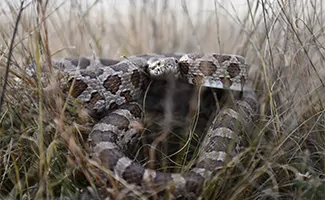
The rattlesnake vaccine is recommended for dogs at risk of a bite by a Western Diamondback rattlesnake (crotalus atrox). This includes high-risk geographical areas (southern CA, southwest U.S.) and dogs who go hiking, camping, or hunting with owners in areas where they may come into contact with rattlesnakes.
This vaccine can also offer some cross-protection for some other types of rattlesnakes and copperheads because the venom of pit vipers shares similar toxic components. Unfortunately, it doesn’t offer protection for the Eastern Diamondback rattlesnake, Mojave rattlesnake, cottonmouths, or coral snakes.
Symptoms
Envenomation by a rattlesnake causes bleeding, severe swelling at the bite site, a dangerous drop in blood pressure, shock, and eventual paralysis of breathing. A bite is considered a major veterinary emergency.
Treatment
Rattlesnake bite treatment involves intravenous fluids, including antivenin (not to be confused with anti-venom), antibiotic and antihistamine administration, cardiac and blood pressure monitoring, and pain management.
Rattlesnake Vaccination
The rattlesnake vaccination doesn’t give dogs immunity from the effects of a bite, but it can help decrease the severity of the symptoms, buying you time to get to your vet for treatment. It can be given as early as 16 weeks of age, requires a booster four weeks after the initial vaccine, and then annual boosters. In warmer climates where snakes are active year-round, it’s often recommended every six months.
Price
The rattlesnake vaccine is administered as an individual immunization. The price is typically around $25 to $35.
Understanding Dog Vaccines
Learn more about when to give vaccines in this video from Purina Australia.
What To Consider When Vaccinating Dogs
You may want to consider some factors before allowing your vet to give your dog vaccinations. Things like your dog’s age, overall health, and allergies are key factors. You also want to know your dog’s vaccination history and the other vaccinations your dog is receiving at that time.
1. Puppies And Elderly Dogs May Have Different Vaccine Needs
Vaccinations have minimum age requirements, and it’s important to stick to them.
Puppies receive protective antibodies through their mothers’ milk during the first few weeks of life, so they don’t need vaccines right away. It is only after puppies are old enough to stop nursing that they need disease protection from vaccines.
Elderly dogs often suffer from compromised immune systems, so vets may be hesitant to give them unnecessary vaccines. There are times when a vet may recommend a longer period between vaccinations for elderly dogs, or they may even skip those vaccinations completely.
2. How Many Vaccinations Can Be Administered At Once?
Giving a dog too many vaccinations at once can increase the probability of side effects. A vet recently told me she would not recommend giving a healthy dog more than five vaccines on any given day. This is why it’s important to space your vaccinations out. Your vet may wait to administer any non-core vaccines due to the core vaccines given at your annual checkup.
3. Allergies To Vaccination Ingredients
Most dogs do just fine after vaccinations. However, like people, some dogs can have allergic reactions to vaccinations. In most cases, these allergic reactions involve mild symptoms, such as mild discomfort at the injection site, mild fever, tiredness, and possibly a few vomiting or diarrhea episodes. These symptoms will last for about 12 to 24 hours after vaccination and will frequently resolve on their own.
Rarely, dogs can experience severe allergic reactions to vaccinations and have symptoms such as facial swelling, difficulty breathing, hives, and collapse. Severe allergic reactions happen within minutes to a few hours after vaccination and require immediate veterinary care.
You may want to consider talking to your vet beforehand about giving your dog a mild antihistamine, such as Benadryl, the morning of your appointment to help reduce the chances of an allergic reaction. Learn more about canine-safe OTC allergy medicines, including dosage amounts.
Find out if your dog has allergies with an at-home allergy kit. We review the best dog allergy tests so you can find out which is the right fit for your dog.
4. Vaccination History
If a dog has had a bad allergic reaction from a previous vaccination, it’s important to note this so you’re aware of future vaccinations that may cause the same reaction. If this is the case, your vet may decide not to administer this vaccination to your dog. Keep track with a log like My Dog’s Medical Records.
5. Your Dog’s Health Status
You don’t want to vaccinate your dog when she’s ill. Vaccinations can put a strain on the body and the immune system. You also never want to vaccinate your dog when she’s recovering from an illness, surgery, or medical treatment unless it’s absolutely necessary.
6. Your Dog’s Lifestyle
Particularly for non-core vaccines, your dog’s lifestyle can determine which vaccines your dog will need. For example, dogs that spend a lot of time by the water are good candidates for the leptospirosis vaccine because dogs can become infected by drinking contaminated water.
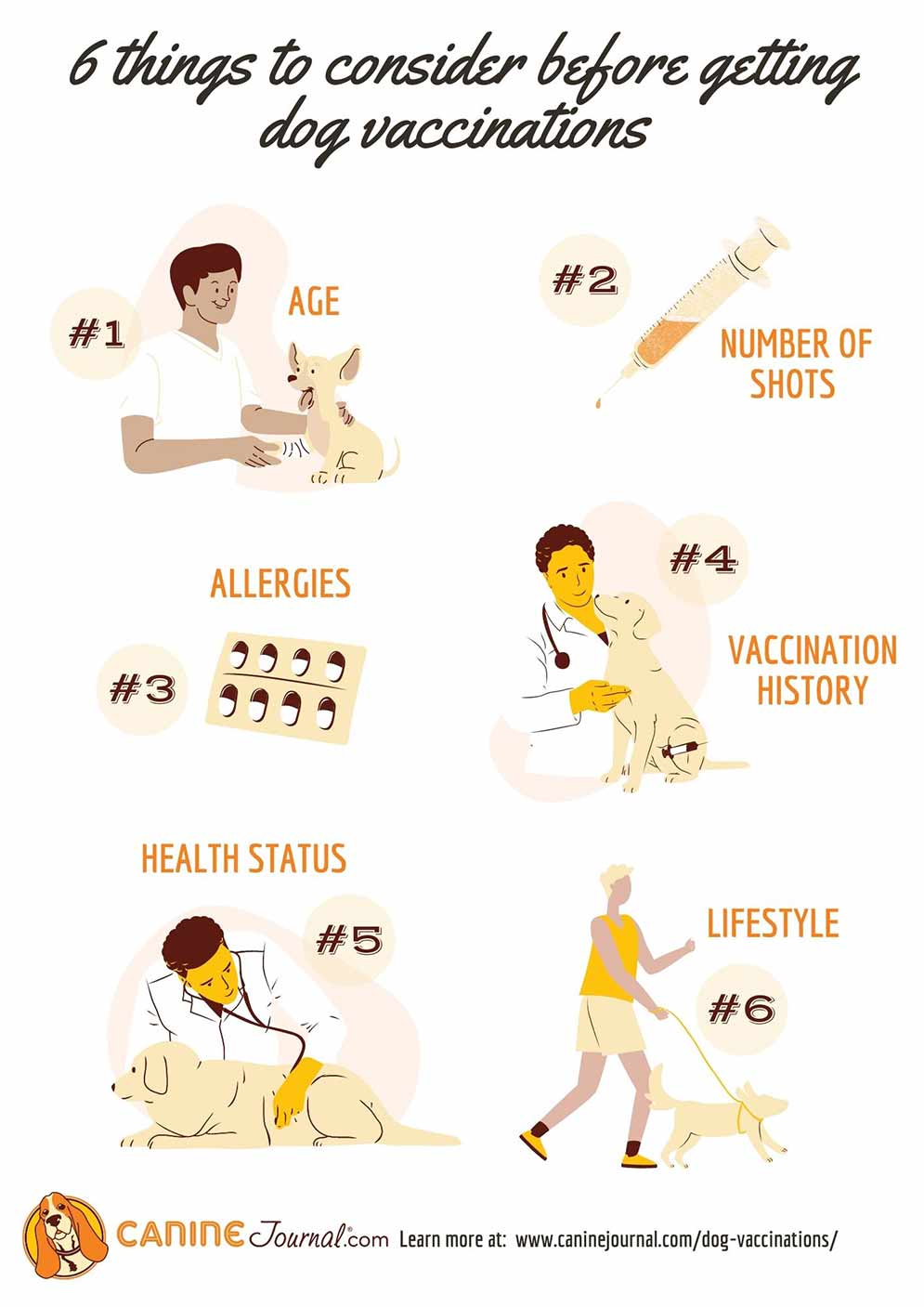
Dr. Jean Dodds Vaccine Protocol: Reduced Vax Schedule
A growing trend taught in veterinary schools and more widely adopted by breeders and pet parents is the Dr. W. Jean Dodds Vaccine Protocol. Basically, it’s just the essential vaccines needed: Distemper and parvo only (and rabies, given at least three to four weeks from the other two).
Some pet parents elect to follow this protocol because they believe that multiple vaccines can adversely affect the immune system and cause auto-immune-related illnesses, damaging the heart tissue.
What Is A Titer Test For Dogs?
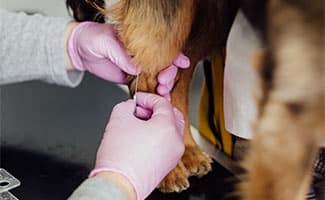
Another way to reduce the number of vaccines is to do a titer test for dogs. After a dog has her initial puppy shots in the first year, a blood sample can determine a dog’s antibody titer or measure the antibody concentration in your dog’s bloodstream.
Research and guidelines suggest that core vaccines give more than a year’s worth of immunity. A dog titer test is one way to gauge if your dog’s immunity falls into the negative threshold and is ready for a booster or not. It takes about 20 minutes to get test results, so your vet can quickly determine which vaccines are needed each year. The cost of a dog titer test can vary, but on average is around $50-100.
Anti-Vaxxing Beliefs
The human anti-vaccination movement is affecting whether or not people have their dogs vaccinated. Some people think vaccinations are harmful to their pets; however, vets consider the core vaccines to be medically necessary. As a result, veterinarians see an increase in dogs with parvovirus, rabies, distemper, and adenovirus-2. And in the case of rabies, this can be especially dangerous for human health as well.
Dog Vaccination Time Table
Below is a vaccination chart of the possible vaccines and the suggested times to administer each. This timeline may not apply to every dog, but it gives you an idea of various scenarios. And remember, giving a dog too many vaccinations at the same time can result in side effects, so be sure to talk to your vet about spacing them out, if possible.
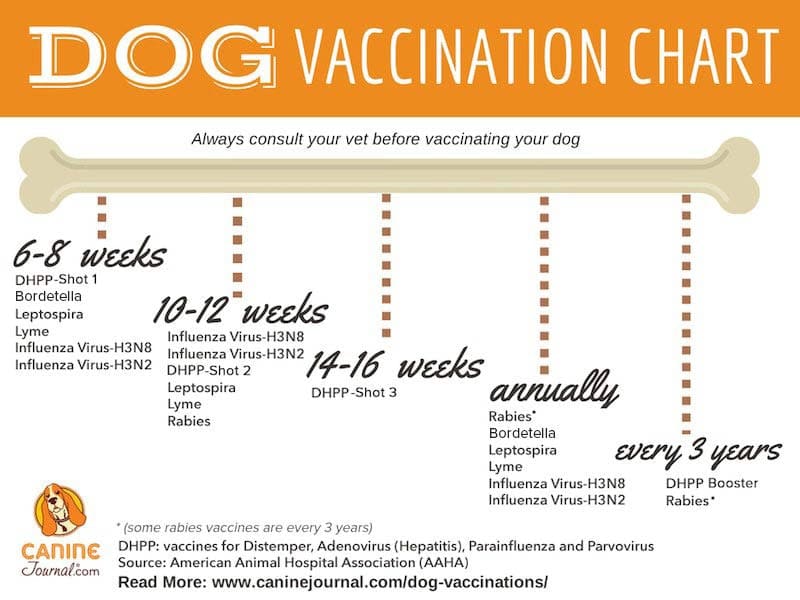
Are Vaccinations Necessary?
As a dog owner, you’ll always wonder if a particular vaccination is truly needed. You don’t want to put your dog through any unnecessary discomfort. Some say that vaccinations simply put your mind at ease, while others believe you should protect your dog from everything harmful. Do what’s best for your dog.
Consult your vet for advice if you find yourself overwhelmed or questioning a vaccine. You and your vet should be able to make the appropriate decision for your dog to be happy and healthy. If cost is a factor for you, consider a wellness plan to help cover the expense of vaccinating your dog.




